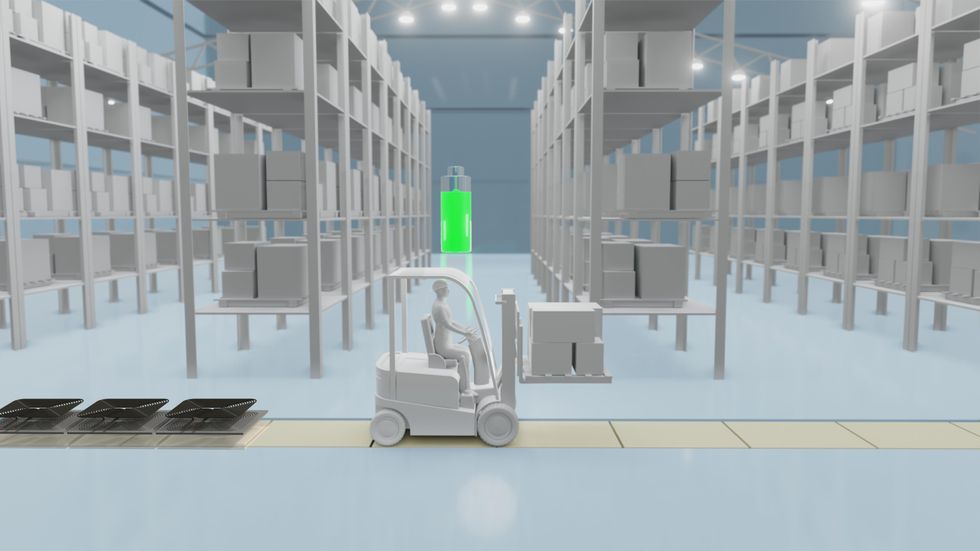Companies such as Wave and Magment offer a variety of approaches for charging vehicles without plugs while they're being stored or even used, but costs stand in the way of broader adoption.
Starting this summer, the public buses in the Oberhaching suburb of Munich, Germany, won’t have to be plugged in to charge overnight anymore. Stefan Schelle, the mayor of Oberhaching, is taking advantage of the fact that an innovative startup has its offices in his community: Magment, short for “magnetizing cement,” will install its underground charging pad in the coming months. As soon as that happens, the buses will charge while they wait at the city’s main station or while stored at their overnight quarters.
In his light-filled office, Magment’s co-founder and CEO, Mauricio Esguerra, demonstrates how the new technology works: The lights on his black model car only flash when he puts the miniature Porsche directly atop the induction plate. “This works just like when you charge your iPhone on its charging pad or heat a pot on an induction range. People don’t have to be afraid of magnetic fields or anything like that,” says the 60-year-old Colombia-born entrepreneur. “The induction only gets activated when the storage battery is placed directly on top.
Patented by Esguerra, the “magnetizing concrete” is able to target the charge quite precisely. The batteries will be mounted in a box underneath the vehicles such as the retrofitted public buses. “Look, here’s one passing by,” says Esguerra, pointing out the window as a blue city bus rides past his office.
An invention finds its purpose
Esguerra grew up in Bogotá, studied physics at the Technical University Munich where he fell in love with a German woman, and started a family in her home country. For 15 years, he developed magnetic products, including the magnetizing cement, for Siemens, Europe’s largest industrial manufacturing company. The patent belonged to Siemens, of course. “But there were hardly any electric vehicles yet,” Esguerra says, “and Siemens didn’t quite know what to do with this invention.”
Esguerra changed companies a few times but, in 2015, he got an offer from Siemens. The patent for the magnetizing cement was expiring and Siemens wasn’t interested in keeping it. Would he, as the inventor, want it back? “I did not hesitate a second,” Esguerra remembers with a smile. “I’m a magnetician at heart.” That same year, he founded Magment to finally make use of the technology he created 20 years ago.
To demonstrate how his cement is made, he opens the lid of a plastic bucket filled with cement powder. Mixed in are fingernail-sized black pieces, so-called ferrites, mainly consisting of three ceramic oxides: iron, nickel and zinc. Conventionally, they are used in electronics such as cell phones, computers and cables. Molded in concrete, ferrites create a magnetic field that can transport charge to a vehicle, potentially eliminating range anxiety for EV drivers.

Molded in concrete, ferrites create a magnetic field that can transport charge to a vehicle, potentially eliminating range anxiety for EV drivers.
Magment
“Ferrites have extremely high rejection rates,” Esguerra adds. “It’s comparable to other ceramics: As soon as there is a small tear or crack, the material is rejected. We are talking about a rejection pile of 500,000 tons per year worldwide. There are mountains of unused materials.”
Exactly this fact was the starting point of his research at Siemens: “What can we do with this energy-intensive material? Back then, it was crushed up and mixed into the cement for building streets, without adding any function.” Today, too, the Magment material can simply be mixed with the conventional material and equipment of the cement industry. “We take advantage of the fact that we don’t have to build factories and don’t have high transportation costs."
In addition to saving resources, recycled ferrite also makes concrete more durable.
No plugs, no charging breaks
A young intern in the office next door winds cables around a new coil. These coils will later be lowered underground in a box, connected to the grid and encased in magnetizing concrete. The recipient box looks similar; it’s another coil but smaller, and it will be mounted underneath the carriage of the vehicle. For a car, the battery box would be 25 by 25 centimeters (about 10 inches), for a scooter five by five centimeters (about two inches).
Esguerra pushes an electric scooter into a cemented scooter rack next to his office. The charging pad is invisible. A faint beep is the only sign that it has started charging. “Childs play!” Esguerra says. “Even when someone puts in the scooter a little crooked, the charge still works. Our efficiency rate is up to 96 percent.” From this summer on, hotel chains in Munich will try out this system with their rental scooters, at a price of about 500 Euros per charging station.
Compared to plug-in charging, Magment’s benefits include smaller batteries that charge slower and, therefore, gentler, so they may last longer. Nobody needs to plug in the vehicles manually anymore. “Personally, I’ve had an EV for six years,” Esguerra says, “and how often does it happen that I forgot to plug it in overnight and then start out with a low charge in the morning? Once people get used to the invisible charging system, it will become the norm.“
There are also downsides: Most car companies aren’t ready for the new technology. Hyundai is the first carmaker that announced plans to equip some new models with inductive charging capability. “How many cars are electrified worldwide?” Esguerra asks and gives the answer himself: “One percent. And how many forklifts are electrified? More than 70 percent!” Therefore, Magment focuses on charging forklifts, e-scooters and buses.

Magment has focused most of its efforts on charging forklifts and other vehicle types that are entirely or predominantly electric, unlike cars.
Magment
On the morning of my visit to Esguerra’s office, a developer of the world’s third-biggest forklift manufacturer is there to inspect how the technology works on the ground. In the basement, a Magment engineer drives an electric forklift over a testbed with invisible charging coils, turning on the green charging light. Esguerra opens the interior of the forklift and points out the two batteries. “With our system, the forklift will only need one battery.” The savings, about 7,000 Euro per forklift, will pay for the installation of Magment’s charging system in warehouses, Esguerra calculates. “Less personnel and no unnecessary wait times for charging will lead to further savings,” he says.
To implement the new technology as efficiently as possible, Magment engineers began recording the transport routes of forklifts in warehouses. “It looks like spaghetti diagrams,” Esguerra explains. “Soon you get the areas where the forklifts pass or wait most frequently. This is where you install the chargers underground.” The forklifts will charge while in use, without having to pause for charging breaks. The method could also work for robots, for instance, in warehouses and distribution centers.
Roads of the future could be electric
Potential disadvantages might become apparent once the technology is more broadly in use. Therefore investors were initially reluctant, Esguerra admits. “Some are eager to be the first but most prefer to wait until the technology has been extensively used in real life.”
A clear hurdle today is that electrifying entire freeways with induction coils would cost at least 1 to 1.5 million Euros per kilometer. The German Department for Transportation even calculates overall costs of 14 to 47 million Euros per kilometer. So, the technology may only make sense for areas where vehicles pass or dwell the longest, like the Oberhaching train station or a busy interstate toll booth.
And yet, Magment is ramping up to compete with other companies that build larger inductive charging pads. The company just finished the first 20 meters of a testbed in Indiana, in partnership with the Purdue University and the Indiana Department of Transportation. Magment is poised to build “the world’s first contactless wireless-charging concrete pavement highway segment,” Purdue University announced.
The project, part of Purdue’s ASPIRE (Advancing Sustainability through Powered Infrastructure for Roadway Electrification) program, is financed by the National Science Foundation. “Indiana is known as the Crossroads of America, and we’re committed to fortifying our position as a transportation leader by innovating to support the emerging vehicle technology,” Governor Eric J. Holcomb said. If testing is successful, including the concrete’s capacity to charge heavy trucks operating at higher power (200 kilowatts and above), Indiana plans to identify a highway segment to install Magment’s charging pads. The earliest would be 2023 at best.
In the meantime, buses in the Californian Antelope Valley, trams at Hollywood's Universal Studios and transit buses in Tampa, Florida, are already charging with inductive technology developed by Wave, a company spun out of Utah State University. In Michigan, Governor Gretchen Whitmer announced plans to build a test route for vehicles to charge while driving, in collaboration with the Israel-based company Electreon, and this year contracted to build the first road-based charging system in the U.S. The state is providing support through an innovative grant program.
Costs remain one of the biggest obstacles, but Esguerra’s vision includes the potential that toll roads could charge a premium for inductive charging capabilities. “And in reverse, a driver who has too much energy could feed his surplus into the grid while driving,” Esguerra dreams.
Meanwhile, Wave’s upcoming big projects are moving trucks along a route in Southern California and running a UPS route between Seattle and Portland. Wave CTO Michael Masquelier describes the inductive power transfer his company champions as “similar to a tuning fork. By vibrating that fork, you sent energy through the air and it is received by another tuning fork across the room. So it’s similar to that, but it’s magnetic energy versus sound energy.”
He hopes to partner with Magment, saying that “the magnetizing cement makes installation easier and improves the energy efficiency.” More research is needed to evaluate which company’s technology will prove to be the most efficient, practical, and cost-effective.
Esguerra’s vision includes the potential that toll roads could charge a premium for inductive charging capabilities. “And in reverse, a driver who has too much energy could feed his surplus into the grid while driving,” Esguerra dreams.
The future will soon arrive in the idyllic town of Bad Staffelstein, a quaint tourist destination in the Upper Franconia region of Germany. Visitors will be taken to and from the main station and the popular thermal bath by driverless shuttles. Together with the University of Wuppertal, the regional government of Upper Franconia wants to turn its district into “the center of autonomous driving.” Magment is about to install inductive charging pads at the shuttle stations and the thermal bath, eliminating the need for the shuttles to stop for charging times. No more drivers, no cable, no range anxiety. Masquelier believes that “wireless and autonomous driving go hand in hand.” Science fiction? It will become science reality in spring 2023.
CORRECTION: An earlier version of the story erroneously mentioned that Electreon required overhead cables.
Trading syphilis for malaria: How doctors treated one deadly disease by infecting patients with another
In the 1920s, doctors induced a high fever in patients - so called "fever therapy" - as a way to help them recover from syphilis, though it involved ethical problems.
If you had lived one hundred years ago, syphilis – a bacterial infection spread by sexual contact – would likely have been one of your worst nightmares. Even though syphilis still exists, it can now be detected early and cured quickly with a course of antibiotics. Back then, however, before antibiotics and without an easy way to detect the disease, syphilis was very often a death sentence.
To understand how feared syphilis once was, it’s important to understand exactly what it does if it’s allowed to progress: the infections start off as small, painless sores or even a single sore near the vagina, penis, anus, or mouth. The sores disappear around three to six weeks after the initial infection – but untreated, syphilis moves into a secondary stage, often presenting as a mild rash in various areas of the body (such as the palms of a person’s hands) or through other minor symptoms. The disease progresses from there, often quietly and without noticeable symptoms, sometimes for decades before it reaches its final stages, where it can cause blindness, organ damage, and even dementia. Research indicates, in fact, that as much as 10 percent of psychiatric admissions in the early 20th century were due to dementia caused by syphilis, also known as neurosyphilis.
Like any bacterial disease, syphilis can affect kids, too. Though it’s spread primarily through sexual contact, it can also be transmitted from mother to child during birth, causing lifelong disability.
The poet-physician Aldabert Bettman, who wrote fictionalized poems based on his experiences as a doctor in the 1930s, described the effect syphilis could have on an infant in his poem Daniel Healy:
I always got away clean
when I went out
With the boys.
The night before
I was married
I went out,—But was not so fortunate;
And I infected
My bride.
When little Daniel
Was born
His eyes discharged;
And I dared not tell
That because
I had seen too much
Little Daniel sees not at all
Given the horrors of untreated syphilis, it’s maybe not surprising that people would go to extremes to try and treat it. One of the earliest remedies for syphilis, dating back to 15th century Naples, was using mercury – either rubbing it on the skin where blisters appeared, or breathing it in as a vapor. (Not surprisingly, many people who underwent this type of “treatment” died of mercury poisoning.)
Other primitive treatments included using tinctures made of a flowering plant called guaiacum, as well as inducing “sweat baths” to eliminate the syphilitic toxins. In 1910, an arsenic-based drug called Salvarsan hit the market and was hailed as a “magic bullet” for its ability to target and destroy the syphilis-causing bacteria without harming the patient. However, while Salvarsan was effective in treating early-stage syphilis, it was largely ineffective by the time the infection progressed beyond the second stage. Tens of thousands of people each year continued to die of syphilis or were otherwise shipped off to psychiatric wards due to neurosyphilis.
It was in one of these psychiatric units in the early 20th century that Dr. Julius Wagner-Juaregg got the idea for a potential cure.
Wagner-Juaregg was an Austrian-born physician trained in “experimental pathology” at the University of Vienna. Wagner-Juaregg started his medical career conducting lab experiments on animals and then moved on to work at different psychiatric clinics in Vienna, despite having no training in psychiatry or neurology.
Wagner-Juaregg’s work was controversial to say the least. At the time, medicine – particularly psychiatric medicine – did not have anywhere near the same rigorous ethical standards that doctors, researchers, and other scientists are bound to today. Wagner-Juaregg would devise wild theories about the cause of their psychiatric ailments and then perform experimental procedures in an attempt to cure them. (As just one example, Wagner-Juaregg would sterilize his adolescent male patients, thinking “excessive masturbation” was the cause of their schizophrenia.)
But sometimes these wild theories paid off. In 1883, during his residency, Wagner-Juaregg noted that a female patient with mental illness who had contracted a skin infection and suffered a high fever experienced a sudden (and seemingly miraculous) remission from her psychosis symptoms after the fever had cleared. Wagner-Juaregg theorized that inducing a high fever in his patients with neurosyphilis could help them recover as well.
Eventually, Wagner-Juaregg was able to put his theory to the test. Around 1890, Wagner-Juaregg got his hands on something called tuberculin, a therapeutic treatment created by the German microbiologist Robert Koch in order to cure tuberculosis. Tuberculin would later turn out to be completely ineffective for treating tuberculosis, often creating severe immune responses in patients – but for a short time, Wagner-Juaregg had some success in using tuberculin to help his dementia patients. Giving his patients tuberculin resulted in a high fever – and after completing the treatment, Wagner-Jauregg reported that his patient’s dementia was completely halted. The success was short-lived, however: Wagner-Juaregg eventually had to discontinue tuberculin as a treatment, as it began to be considered too toxic.
By 1917, Wagner-Juaregg’s theory about syphilis and fevers was becoming more credible – and one day a new opportunity presented itself when a wounded soldier, stricken with malaria and a related fever, was accidentally admitted to his psychiatric unit.
When his findings were published in 1918, Wagner-Juaregg’s so-called “fever therapy” swept the globe.
What Wagner-Juaregg did next was ethically deplorable by any standard: Before he allowed the soldier any quinine (the standard treatment for malaria at the time), Wagner-Juaregg took a small sample of the soldier’s blood and inoculated three syphilis patients with the sample, rubbing the blood on their open syphilitic blisters.
It’s unclear how well the malaria treatment worked for those three specific patients – but Wagner-Juaregg’s records show that in the span of one year, he inoculated a total of nine patients with malaria, for the sole purpose of inducing fevers, and six of them made a full recovery. Wagner-Juaregg’s treatment was so successful, in fact, that one of his inoculated patients, an actor who was unable to work due to his dementia, was eventually able to find work again and return to the stage. Two additional patients – a military officer and a clerk – recovered from their once-terminal illnesses and returned to their former careers as well.
When his findings were published in 1918, Wagner-Juaregg’s so-called “fever therapy” swept the globe. The treatment was hailed as a breakthrough – but it still had risks. Malaria itself had a mortality rate of about 15 percent at the time. Many people considered that to be a gamble worth taking, compared to dying a painful, protracted death from syphilis.
Malaria could also be effectively treated much of the time with quinine, whereas other fever-causing illnesses were not so easily treated. Triggering a fever by way of malaria specifically, therefore, became the standard of care.
Tens of thousands of people with syphilitic dementia would go on to be treated with fever therapy until the early 1940s, when a combination of Salvarsan and penicillin caused syphilis infections to decline. Eventually, neurosyphilis became rare, and then nearly unheard of.
Despite his contributions to medicine, it’s important to note that Wagner-Juaregg was most definitely not a person to idolize. In fact, he was an outspoken anti-Semite and proponent of eugenics, arguing that Jews were more prone to mental illness and that people who were mentally ill should be forcibly sterilized. (Wagner-Juaregg later became a Nazi sympathizer during Hitler’s rise to power even though, bizarrely, his first wife was Jewish.) Another problematic issue was that his fever therapy involved experimental treatments on many who, due to their cognitive issues, could not give informed consent.
Lack of consent was also a fundamental problem with the syphilis study at Tuskegee, appalling research that began just 14 years after Wagner-Juaregg published his “fever therapy” findings.
Still, despite his outrageous views, Wagner-Juaregg was awarded the Nobel Prize in Medicine or Physiology in 1927 – and despite some egregious human rights abuses, the miraculous “fever therapy” was partly responsible for taming one of the deadliest plagues in human history.
If approved by the FDA, a new procedure for kidney transplants that doesn't require anti-rejection medication could soon become the standard of care.
Talaris Therapeutics, Inc., a biotech company based in Louisville, Ky., is edging closer to eradicating the need for immunosuppressive drugs for kidney transplant patients.
In a series of research trials, Talaris is infusing patients with immune system stem cells from their kidney donor to create a donor-derived immune system that accepts the organ without the need for anti-rejection medications. That newly generated system does not attack other parts of the recipient’s body and also fights off infections and diseases as a healthy immune system would.
Talaris is now moving into the final clinical trial, phase III, before submitting for FDA approval. Known as Freedom-1, this trial has 17 sites open throughout the U.S., and Talaris will enroll a total of 120 kidney transplant recipients. One day after receiving their donor’s kidney, 80 people will undergo the company’s therapy, involving the donor’s stem cells and other critical cells that are processed at their facility. Forty will have a regular kidney transplant and remain on immunosuppression to provide a control group.
“The beauty of this procedure is that I don’t have to take all of the anti-rejection drugs,” says Robert Waddell, a finance professional. “I forget that I ever had any kidney issues. That’s how impactful it is.”
The procedure was pioneered decades ago by Suzanne Ildstad as a faculty member at the University of Pittsburgh before she became founding CEO of Talaris and then its Chief Scientific Officer. If approved by the FDA, the method could soon become the standard of care for patients in need of a kidney transplant.
“We are working to find a way to reprogram the immune system of transplant recipients so that it sees the donated organ as [belonging to one]self and doesn’t attack it,” explains Scott Requadt, CEO of Talaris. “That obviates the need for lifelong immunosuppression.”
Each year, there are roughly 20,000 kidney transplants, making kidneys the most transplanted organ. About 6,500 of those come from living donors, while deceased donors provide roughly 13,000.
One of the challenges, Requadt points out, is that kidney transplant recipients aren’t always aware of all the implications of immunosuppression. Typically, they will need to take about 20 anti-rejection drugs several times a day to provide immunosuppression as well as treat complications caused by the toxicities of immunosuppression medications. The side effects of chronic immunosuppression include weight gain, high blood pressure, and high cholesterol. These cardiovascular comorbidities, Requadt says, are “often more frequently the cause of death than failure of a transplanted organ.”
Patients who are chronically immunosuppressed generally have much higher rates of infections and cancers that have an immune component to them, such as skin cancers.
For the past couple of years, those patients have experienced heightened anxiety because of the COVID-19 pandemic. Immune-suppressing medicine used to protect their new organ also makes it hard for patients to build immunity to foreign invaders like COVID-19.
A study appearing in the Proceedings of the National Academy of Sciences found the probability of a pandemic with similar impact to COVID-19 is about 2 percent in any year, and estimated that the probability of novel disease outbreaks will grow three-fold in the next few decades. All the more reason to identify an FDA-approved alternative to harsh immunosuppressive drugs.
Of the 18 patients during the phase II research trial who received the Talaris therapy, didn’t take immunosuppression medication and were vaccinated, only two ended up with a COVID infection, according to a review of the data. Among patients who needed to continue taking immunosuppressants or those who didn’t have them but were unvaccinated, the rates of infection were between 40 and 60 percent.
In the earlier phase II study by Talaris with 37 patients, the combined transplantation approach allowed 70 percent of patients to get off all immunosuppression.
“We’ve followed that whole cohort for more than six and a half years and one of them for 12 years from transplant, and every single patient that we got off immunosuppression has been able to stay off,” Requadt says.
That one patient, Robert Waddell, 55, was especially thankful to be weaned off immunosuppressive drugs approximately one year after his transplant procedure. The Louisville resident had long watched his mother, sister and other family members with polycystic kidney disease, or PKD, suffer the effects of chronic immunosuppression. That became his greatest fear when he was diagnosed with end stage renal failure.
Waddell enrolled in the phase II research taking place in Louisville after learning about it in early 2006. He chose to remain in the study when it relocated its clinical headquarters to Northwestern University’s medical center in Chicago a couple years later.
Before surgery, he underwent an enervating regimen of chemotherapy and radiation. It’s required to clear out a patient’s bone marrow cells so that they can be replaced by the donor’s cells. Waddell says the result was worth it: he had his combined kidney and immune system stem cell transplant in May 2009, without any need for chronic immunosuppression.
“I call it ‘short-term pain, long-term gain,’ because it was difficult to go through the conditioning, but after that, it was great,” he says. “I’ve talked to so many kidney recipients who say, ‘I wish I would have done that,’ because most people don’t think about clinical trials, but I was very fortunate.”
Waddell has every reason to support the success of this research, especially given the genetic disorder, PKD, that has plagued his family. One of his four children has PKD. He is anxious for the procedure to become standard of care, if and when his son needs it.

The Talaris procedure was pioneered decades ago by Suzanne Ildstad, founding CEO of Talaris and the company's Chief Scientific Officer, pictured here with the current CEO, Scott Requadt.
Talaris
“The beauty of this procedure is that I don’t have to take all of the anti-rejection drugs,” says Waddell, a finance professional. “I forget that I ever had any kidney issues. That’s how impactful it is.”
Talaris will continue to follow Waddell and the rest of his cohort to track the effectiveness and safety of the procedure. According to Requadt, the average life of a transplanted kidney is 12 to 15 years, partly because the immunosuppressive drugs worsen the functioning of the organ each year.
“We were the first group to show that we could robustly and fairly reproducibly do this in a clinical setting in humans,” Requadt says. “Most important, we’ve been able to show that we can still get a good engraftment of the stem cells from the donor, even if there is a profound…mismatch between the donor and the recipient’s immune systems.”
In kidney transplantation, it’s important to match for human leukocyte antigens (HLA) because there is a better graft survival in HLA-identical kidney transplants compared with HLA mismatched transplants.
About three months after the transplant, Talaris researchers look for evidence that the donated immune cells and stem cells have engrafted, while making a donor immune system for the patient. If more than 50 percent of the T cells contain the donor’s DNA after six months, patients can start taking fewer immunosuppressants.
“We know from phase II that in our patients who were able to tolerize [accept the organ without rejection] to their donated organ, we saw completely preserved and in fact slightly increased kidney function,” Requadt says. “So, it stands to reason that if you eliminate the drugs that are associated with declining kidney function that you would preserve kidney function, so hopefully the patient will have that one kidney for life.”
Matthew Cooper, director of kidney and pancreas transplantation for MedStar Georgetown Transplant Institute in Washington, DC, states that, “Right now, the Achilles’ heel is we have such a long waiting list and few donors that people die every day waiting for a kidney transplant. Eventually, we will eliminate the organ shortage so that people won’t die from organ failure.”
Cooper, a nationally recognized clinical transplant surgeon for 20 years, says when he started his career, finding a way for patients to forgo immunosuppression was considered “the Holy Grail” of modern transplant medicine.
“Now that we’ve got the protocols in place and some personal examples of how that can happen, it’s pretty exciting to see that all coming together,” he adds.


